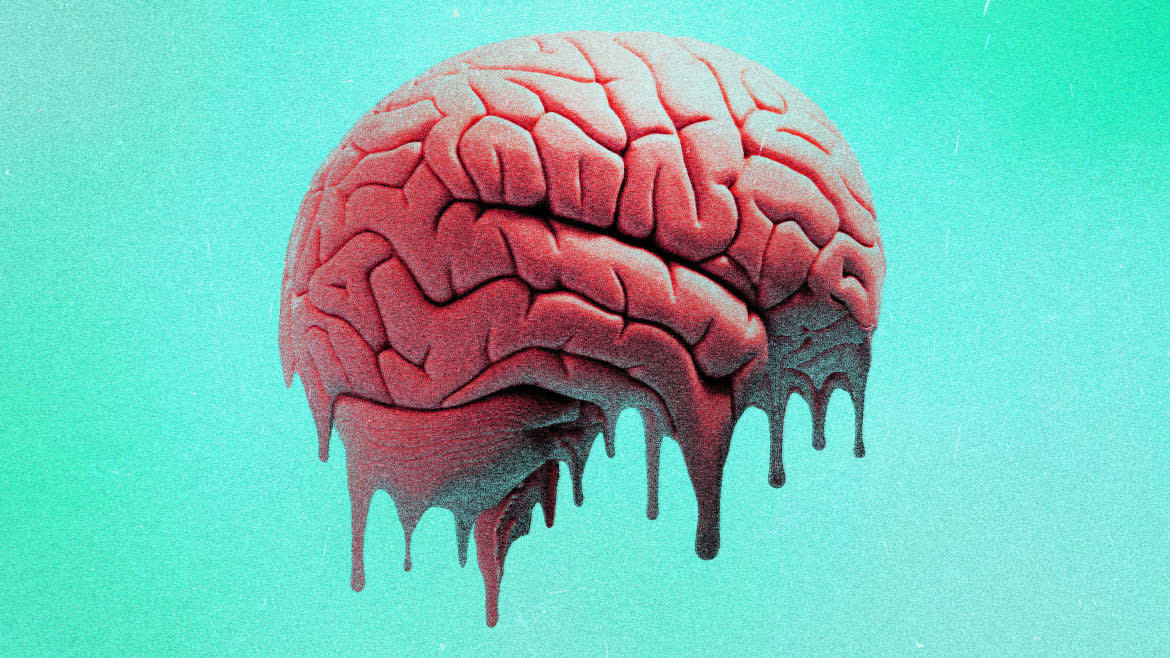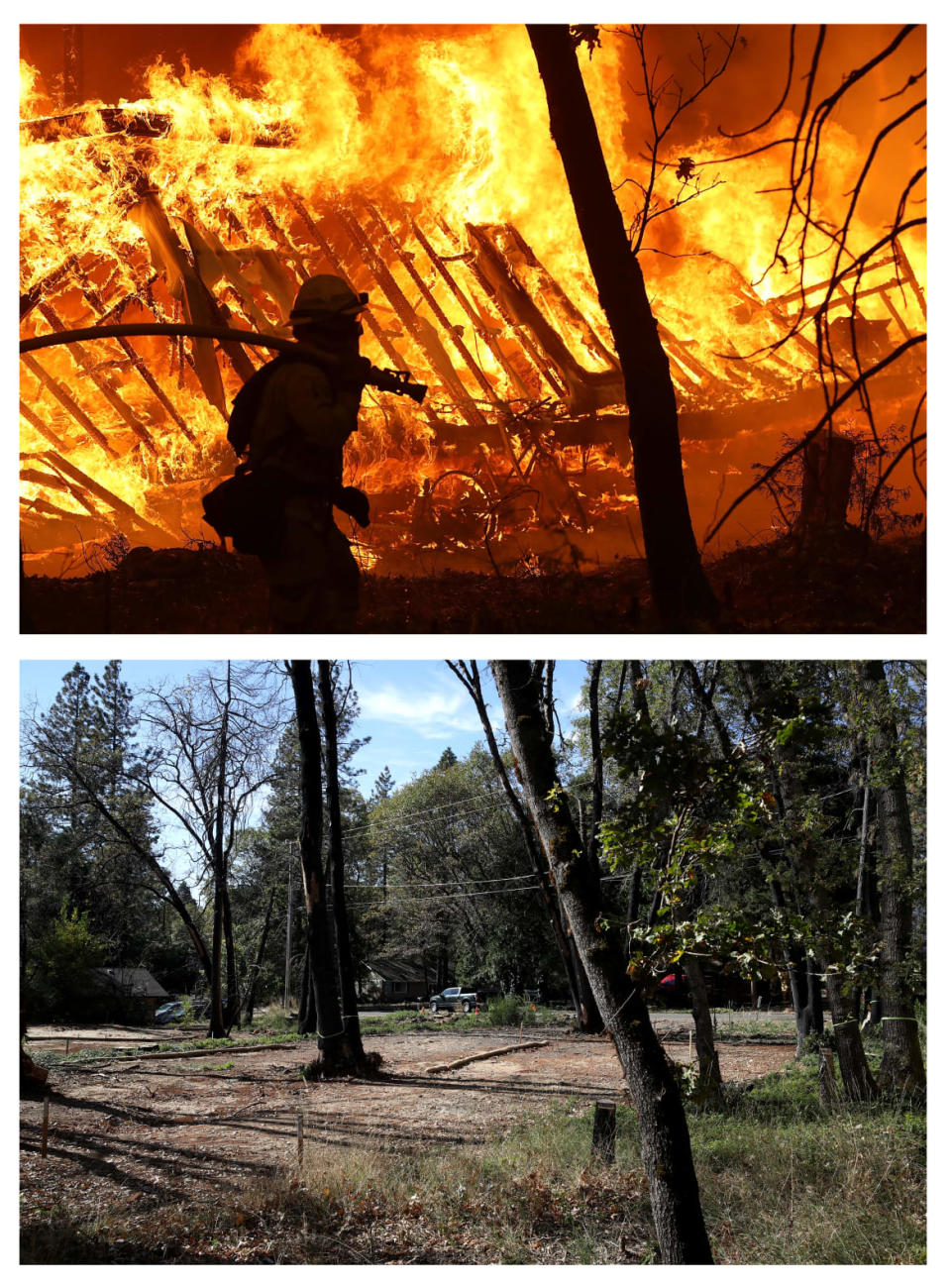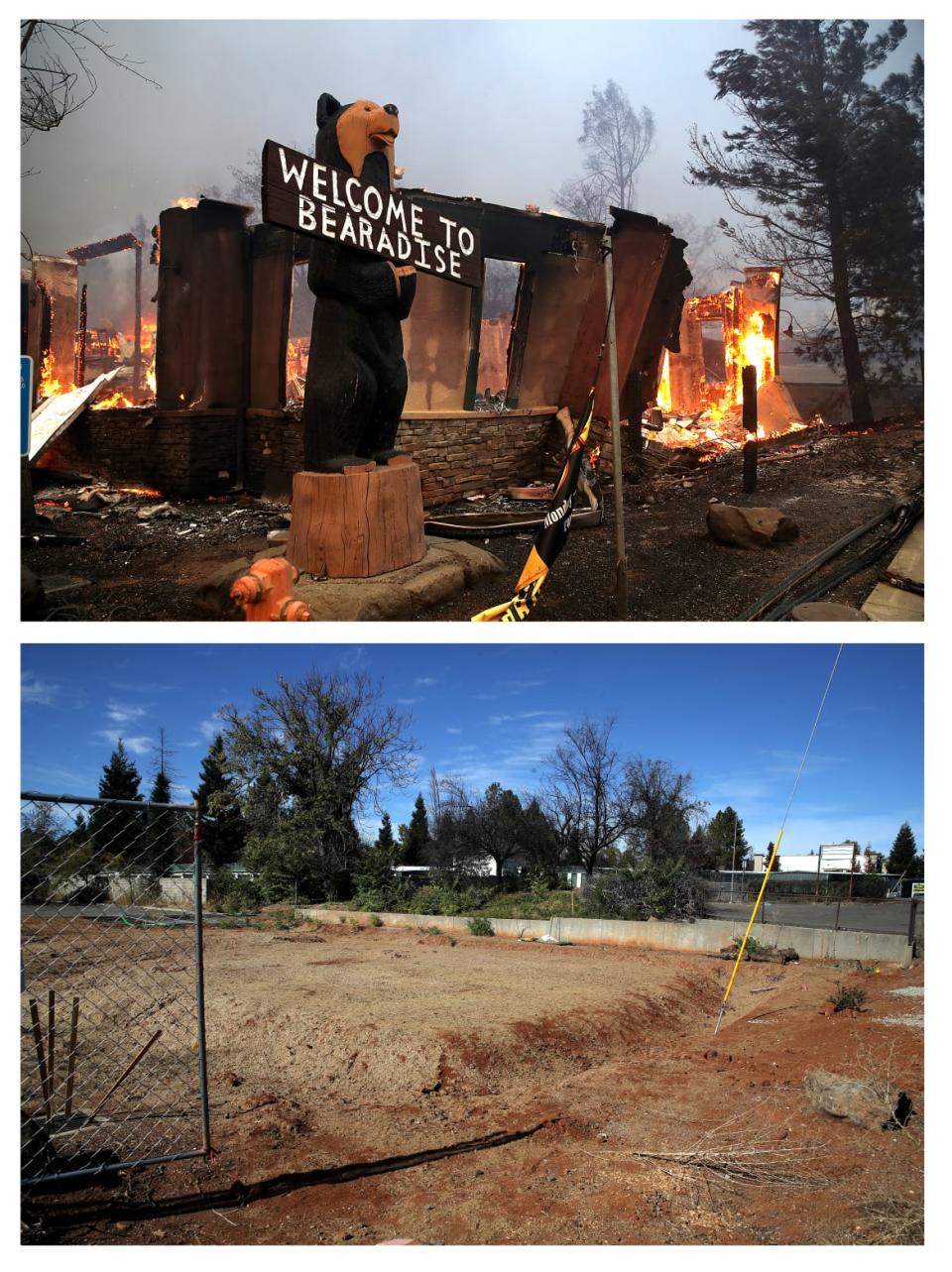Climate Trauma Is Rewiring Our Brains Into Something Alarmingly Worse

Sarah Norr still can’t stand the smell of smoke. Even a relaxing walk through her local park can be a minefield—last summer, the scent rising from a neighborhood cookout triggered so much anxiety that she had to go home. “I was like, ‘Oh, my god, I can’t be here,’” she told The Daily Beast.
Norr is a longtime resident of California’s Bay Area and no stranger to wildfires. But the Camp Fire of 2018 was something different—the sky above Norr's neighborhood glowed an angry orange for weeks, and she and her then-2-year-old could scarcely leave the house for fear of inhaling the thick miasma of smoke. Over four years later, she and her daughter are coping with the lingering trauma from the wildfire’s apocalyptic smog, heat, and destruction. And they aren’t alone.

Top: A Cal Fire firefighter monitors a burning home as the Camp Fire moves through the area on November 9, 2018 in Magalia, California.
Bottom: An October 21, 2019 view of a lot where that same home burned down.
Climate trauma, the unofficial name for the multitude of adverse mental health impacts brought on by extreme climate change-induced weather events, is an emerging area of interest for psychologists and environmental scientists alike. Some experts estimate that one in five Americans have experienced climate-related trauma—a number that will only grow as the planet continues to warm.
However, much of the research into climate-related health impacts has, historically, focused on its direct physical manifestations. For events like wildfires encouraged by hotter and drier conditions, for example, public health experts have been zeroing on effects like heat stroke and lung damage from smoke inhalation.
But for the first time, a new study, published today in PLOS Biology, has revealed the lasting impacts of climate trauma on brain function. “It’s definitely going to be something that we would want to understand much better and develop resiliency tools for,” Jyoti Mishra, a computational neurobiologist at the University of California, San Diego and co-author of the paper, told The Daily Beast.
Mishra and her team evaluated 75 California residents, about one-third of whom had directly experienced California’s devastating 2018 Camp Fire—the most destructive wildfire in the state’s history at the time. A third of the participants were indirectly affected by the wildfires, while one-third had managed to avoided direct impacts to their health and livelihoods.
The UC San Diego team found that people who had first-hand exposure to the wildfire had lingering changes to their cognitive functions relative to the other two groups, even a year later. Those survivors had to expend more effort to concentrate on simple tasks, a symptom consistent with PTSD.
Hit the Snooze Button if You Want to Save the Planet
However, Mishra and her co-authors believe that these changes in cognition represent a diagnosis that isn’t currently listed in the DSM-5. “This is not exactly PTSD,” she said, “It’s a new kind of trauma.”
“Certainly it’s a problem that merits attention,” said Susan Clayton, a conservation psychologist at the College of Wooster in Ohio, who was not involved in the study. Clayton told The Daily Beast that in addition to the millions of people who experience direct climate trauma, millions more suffer from indirect anxiety and depression brought on by climate change. Nearly 78 percent of Americans report experiencing concern about the climate, with almost 50 percent expressing a high level of alarm. Those with the most anxiety tend to skew younger, less white, and less wealthy.

Top: The Black Bear Diner burns as the Camp Fire moves through the area on November 8, 2018 in Paradise, California.
Bottom: A view of the same property on October 21, 2019.
“It is a crisis. And crises are bad for people’s mental health,” said Alaina Wood, a climate communicator based in Johnson City, Tennessee. So the question is, how can folks manage overwhelming grief and anxiety of just existing in an ever-warming world?
One strategy that Wood employs is to limit her doom scrolling exposure. Wood has to maintain a social media presence as part of her job, and she also has to stay up-to-date on the latest climate science. But, she told The Daily Beast, she tries to read stories about climate solutions as much as she can. This helps cultivate a sense of resilience, allowing her to focus on small steps she can take rather than becoming overwhelmed by the scope of the problem.
Increasingly, psychologists have begun recommending that folks fight climate anxiety and trauma by simply getting out into nature, a strategy known as “eco therapy.” There’s good evidence for its effectiveness; studies have shown, for example, that taking a 50-minute walk in the woods improves the cognitive powers of people with depression and reduces blood pressure in stressed-out students. Wood has found some relief in this practice as well. “Just sitting outside for like fifteen minutes a day really helps ground me, but also helps me recognize that nature is still here, and it’s worth fighting for,” she said.
But as Norr discovered on her walk last summer, eco therapy can become complicated for people with more acute climate trauma. The human brain is malleable enough to change, but also stubborn enough for very powerful experiences to cause effects that last a long time.
“People are traumatized by the very environment that is soothing otherwise,” said Jyoti. Something as simple as a strong wind or the scent of fire might stir up anxiety-inducing memories.
The Mental-Health Burden of Climate Change Continues Long After the Storm
Overall, said Clayton, “just strengthening the mental health care system would be helpful.” Better access to mental health care, especially for lower-income communities who often bear the brunt of climate change, would go a long way towards alleviating some of the worst climate-induced trauma. But research like Clayton’s and Jyoti’s is an important first step—raising awareness of climate trauma and eco anxiety is crucial to helping mental health professionals figure out better ways to treat it.
This is a part of the climate conversation that often gets lost underneath the discussions around carbon emissions and changing weather, activism to spur new policies, and technological solutions to help lower global temperatures accordingly. We can’t ignore the emotional and psychological toll that our changing climate exacts, Mishra said. “We also need to figure out how people are dealing with it, and how we can make that better.”
Get the Daily Beast's biggest scoops and scandals delivered right to your inbox. Sign up now.
Stay informed and gain unlimited access to the Daily Beast's unmatched reporting. Subscribe now.

